Analyzing Sustainability Practices in Operations Management
VerifiedAdded on 2023/06/15
|13
|3262
|76
Report
AI Summary
This report explores the concept of sustainable development in the context of Mandarin Oriental Hotel in Malaysia, examining the advantages and disadvantages of adopting sustainable development principles. It identifies key sustainability issues such as waste management, water resource management, and carbon emissions, providing recommended action plans for environmental preservation to enhance sustainability, competitiveness, and profit. The report discusses the hotel's adherence to sustainable development principles like futurity, inter-generational equity, participation, and balancing economic and environmental factors. It also analyzes the challenges faced by the hotel, including the high rates of waste and water wastage, and proposes solutions such as creating a waste audit team, training staff, implementing water demand management, and collaborating with the government for improved water conservation.
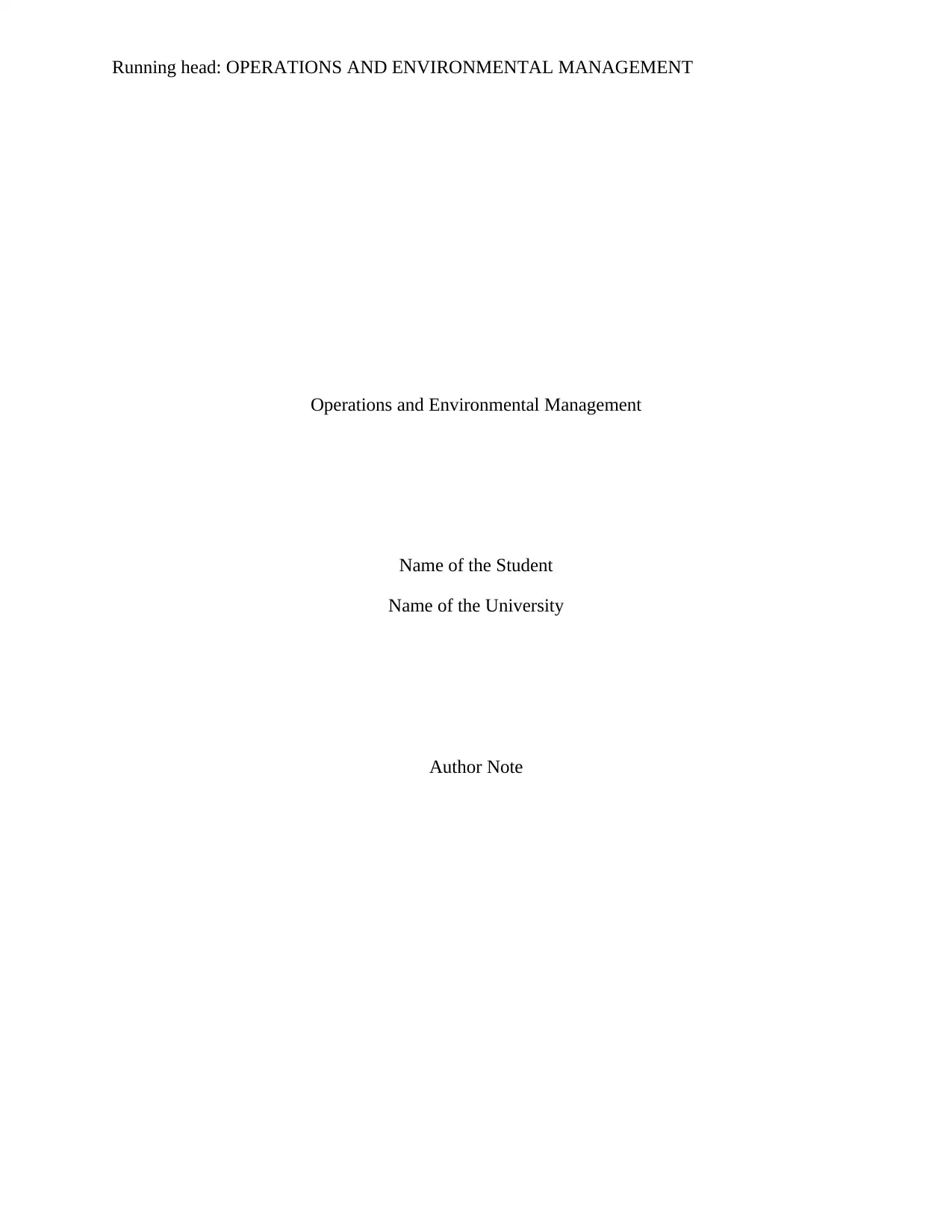
Running head: OPERATIONS AND ENVIRONMENTAL MANAGEMENT
Operations and Environmental Management
Name of the Student
Name of the University
Author Note
Operations and Environmental Management
Name of the Student
Name of the University
Author Note
Paraphrase This Document
Need a fresh take? Get an instant paraphrase of this document with our AI Paraphraser
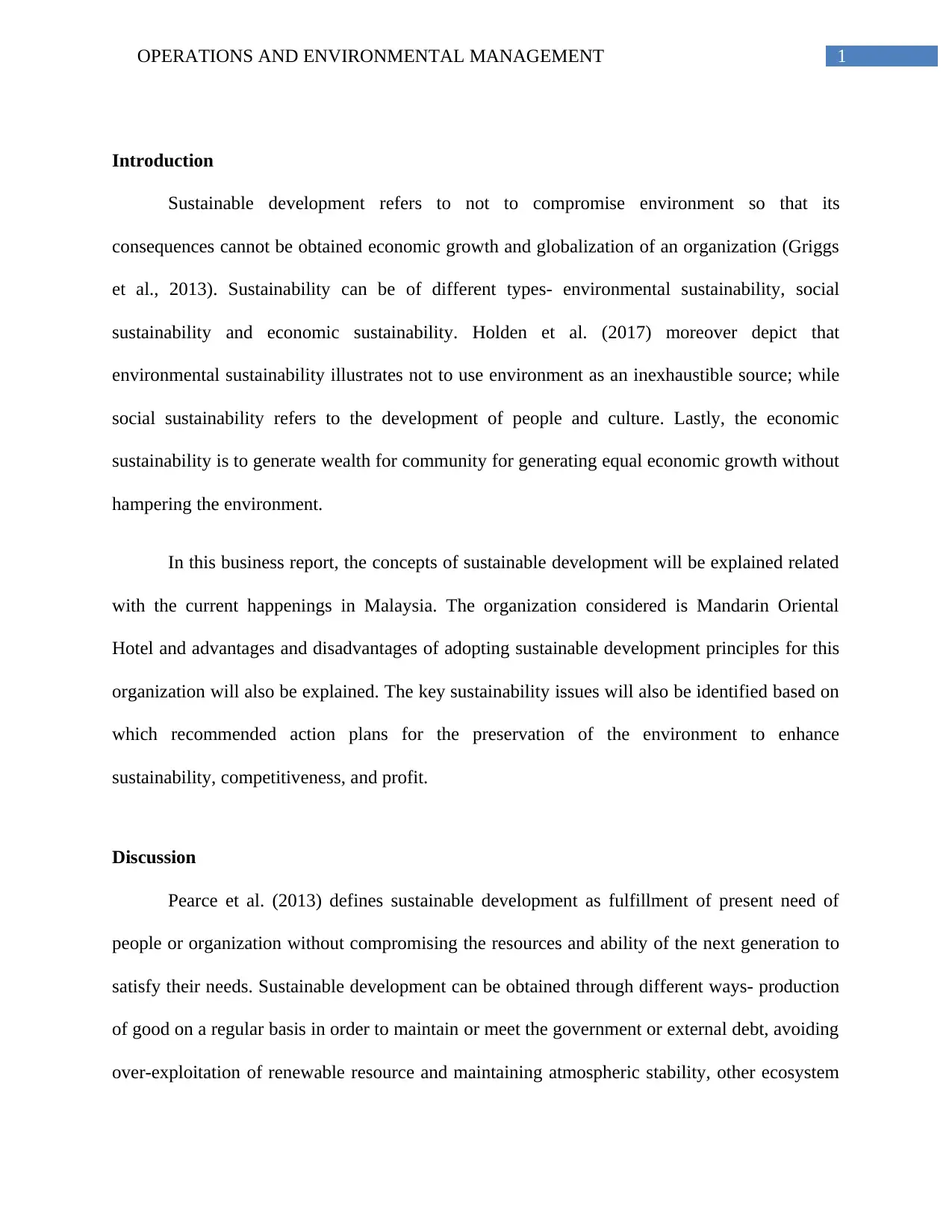
1OPERATIONS AND ENVIRONMENTAL MANAGEMENT
Introduction
Sustainable development refers to not to compromise environment so that its
consequences cannot be obtained economic growth and globalization of an organization (Griggs
et al., 2013). Sustainability can be of different types- environmental sustainability, social
sustainability and economic sustainability. Holden et al. (2017) moreover depict that
environmental sustainability illustrates not to use environment as an inexhaustible source; while
social sustainability refers to the development of people and culture. Lastly, the economic
sustainability is to generate wealth for community for generating equal economic growth without
hampering the environment.
In this business report, the concepts of sustainable development will be explained related
with the current happenings in Malaysia. The organization considered is Mandarin Oriental
Hotel and advantages and disadvantages of adopting sustainable development principles for this
organization will also be explained. The key sustainability issues will also be identified based on
which recommended action plans for the preservation of the environment to enhance
sustainability, competitiveness, and profit.
Discussion
Pearce et al. (2013) defines sustainable development as fulfillment of present need of
people or organization without compromising the resources and ability of the next generation to
satisfy their needs. Sustainable development can be obtained through different ways- production
of good on a regular basis in order to maintain or meet the government or external debt, avoiding
over-exploitation of renewable resource and maintaining atmospheric stability, other ecosystem
Introduction
Sustainable development refers to not to compromise environment so that its
consequences cannot be obtained economic growth and globalization of an organization (Griggs
et al., 2013). Sustainability can be of different types- environmental sustainability, social
sustainability and economic sustainability. Holden et al. (2017) moreover depict that
environmental sustainability illustrates not to use environment as an inexhaustible source; while
social sustainability refers to the development of people and culture. Lastly, the economic
sustainability is to generate wealth for community for generating equal economic growth without
hampering the environment.
In this business report, the concepts of sustainable development will be explained related
with the current happenings in Malaysia. The organization considered is Mandarin Oriental
Hotel and advantages and disadvantages of adopting sustainable development principles for this
organization will also be explained. The key sustainability issues will also be identified based on
which recommended action plans for the preservation of the environment to enhance
sustainability, competitiveness, and profit.
Discussion
Pearce et al. (2013) defines sustainable development as fulfillment of present need of
people or organization without compromising the resources and ability of the next generation to
satisfy their needs. Sustainable development can be obtained through different ways- production
of good on a regular basis in order to maintain or meet the government or external debt, avoiding
over-exploitation of renewable resource and maintaining atmospheric stability, other ecosystem
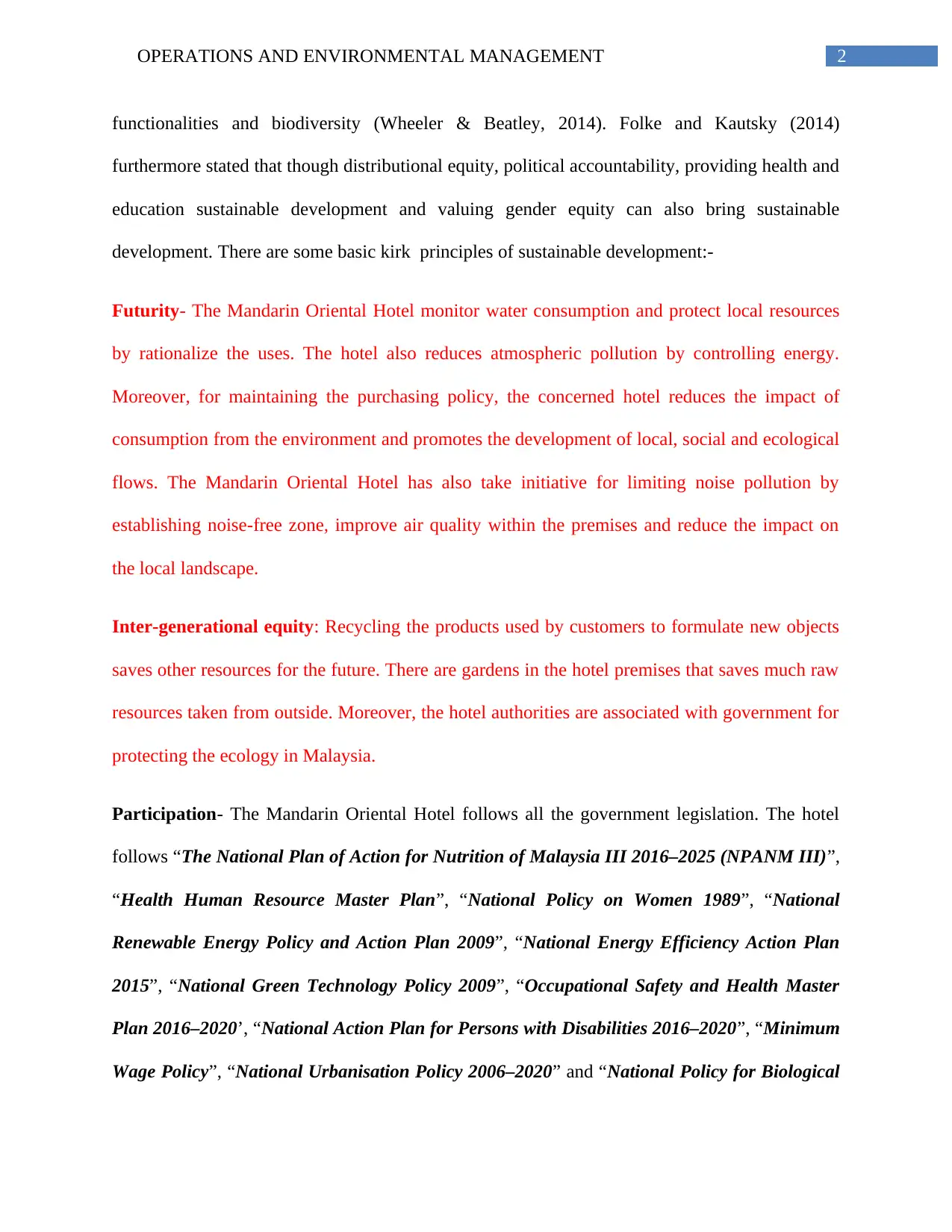
2OPERATIONS AND ENVIRONMENTAL MANAGEMENT
functionalities and biodiversity (Wheeler & Beatley, 2014). Folke and Kautsky (2014)
furthermore stated that though distributional equity, political accountability, providing health and
education sustainable development and valuing gender equity can also bring sustainable
development. There are some basic kirk principles of sustainable development:-
Futurity- The Mandarin Oriental Hotel monitor water consumption and protect local resources
by rationalize the uses. The hotel also reduces atmospheric pollution by controlling energy.
Moreover, for maintaining the purchasing policy, the concerned hotel reduces the impact of
consumption from the environment and promotes the development of local, social and ecological
flows. The Mandarin Oriental Hotel has also take initiative for limiting noise pollution by
establishing noise-free zone, improve air quality within the premises and reduce the impact on
the local landscape.
Inter-generational equity: Recycling the products used by customers to formulate new objects
saves other resources for the future. There are gardens in the hotel premises that saves much raw
resources taken from outside. Moreover, the hotel authorities are associated with government for
protecting the ecology in Malaysia.
Participation- The Mandarin Oriental Hotel follows all the government legislation. The hotel
follows “The National Plan of Action for Nutrition of Malaysia III 2016–2025 (NPANM III)”,
“Health Human Resource Master Plan”, “National Policy on Women 1989”, “National
Renewable Energy Policy and Action Plan 2009”, “National Energy Efficiency Action Plan
2015”, “National Green Technology Policy 2009”, “Occupational Safety and Health Master
Plan 2016–2020’, “National Action Plan for Persons with Disabilities 2016–2020”, “Minimum
Wage Policy”, “National Urbanisation Policy 2006–2020” and “National Policy for Biological
functionalities and biodiversity (Wheeler & Beatley, 2014). Folke and Kautsky (2014)
furthermore stated that though distributional equity, political accountability, providing health and
education sustainable development and valuing gender equity can also bring sustainable
development. There are some basic kirk principles of sustainable development:-
Futurity- The Mandarin Oriental Hotel monitor water consumption and protect local resources
by rationalize the uses. The hotel also reduces atmospheric pollution by controlling energy.
Moreover, for maintaining the purchasing policy, the concerned hotel reduces the impact of
consumption from the environment and promotes the development of local, social and ecological
flows. The Mandarin Oriental Hotel has also take initiative for limiting noise pollution by
establishing noise-free zone, improve air quality within the premises and reduce the impact on
the local landscape.
Inter-generational equity: Recycling the products used by customers to formulate new objects
saves other resources for the future. There are gardens in the hotel premises that saves much raw
resources taken from outside. Moreover, the hotel authorities are associated with government for
protecting the ecology in Malaysia.
Participation- The Mandarin Oriental Hotel follows all the government legislation. The hotel
follows “The National Plan of Action for Nutrition of Malaysia III 2016–2025 (NPANM III)”,
“Health Human Resource Master Plan”, “National Policy on Women 1989”, “National
Renewable Energy Policy and Action Plan 2009”, “National Energy Efficiency Action Plan
2015”, “National Green Technology Policy 2009”, “Occupational Safety and Health Master
Plan 2016–2020’, “National Action Plan for Persons with Disabilities 2016–2020”, “Minimum
Wage Policy”, “National Urbanisation Policy 2006–2020” and “National Policy for Biological
⊘ This is a preview!⊘
Do you want full access?
Subscribe today to unlock all pages.

Trusted by 1+ million students worldwide
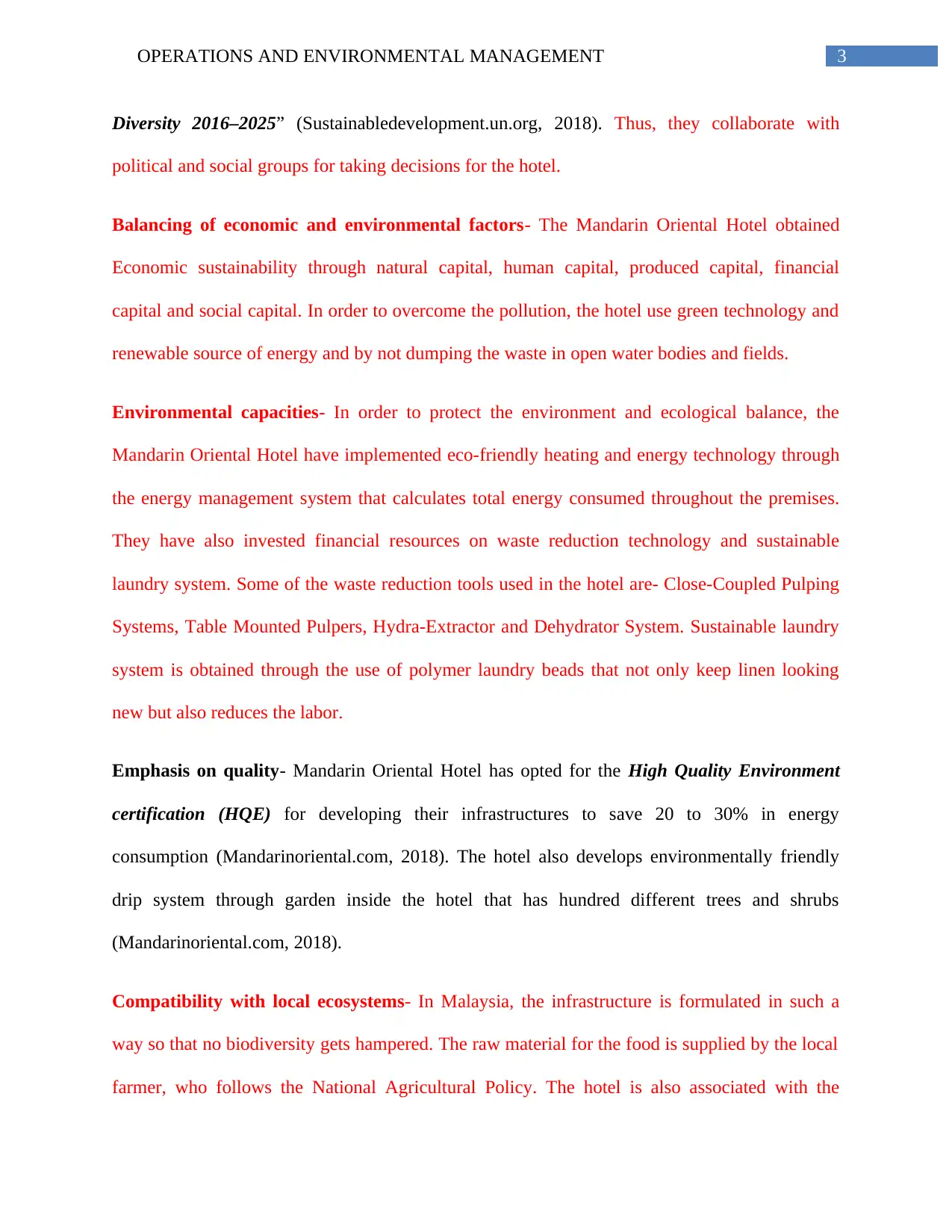
3OPERATIONS AND ENVIRONMENTAL MANAGEMENT
Diversity 2016–2025” (Sustainabledevelopment.un.org, 2018). Thus, they collaborate with
political and social groups for taking decisions for the hotel.
Balancing of economic and environmental factors- The Mandarin Oriental Hotel obtained
Economic sustainability through natural capital, human capital, produced capital, financial
capital and social capital. In order to overcome the pollution, the hotel use green technology and
renewable source of energy and by not dumping the waste in open water bodies and fields.
Environmental capacities- In order to protect the environment and ecological balance, the
Mandarin Oriental Hotel have implemented eco-friendly heating and energy technology through
the energy management system that calculates total energy consumed throughout the premises.
They have also invested financial resources on waste reduction technology and sustainable
laundry system. Some of the waste reduction tools used in the hotel are- Close-Coupled Pulping
Systems, Table Mounted Pulpers, Hydra-Extractor and Dehydrator System. Sustainable laundry
system is obtained through the use of polymer laundry beads that not only keep linen looking
new but also reduces the labor.
Emphasis on quality- Mandarin Oriental Hotel has opted for the High Quality Environment
certification (HQE) for developing their infrastructures to save 20 to 30% in energy
consumption (Mandarinoriental.com, 2018). The hotel also develops environmentally friendly
drip system through garden inside the hotel that has hundred different trees and shrubs
(Mandarinoriental.com, 2018).
Compatibility with local ecosystems- In Malaysia, the infrastructure is formulated in such a
way so that no biodiversity gets hampered. The raw material for the food is supplied by the local
farmer, who follows the National Agricultural Policy. The hotel is also associated with the
Diversity 2016–2025” (Sustainabledevelopment.un.org, 2018). Thus, they collaborate with
political and social groups for taking decisions for the hotel.
Balancing of economic and environmental factors- The Mandarin Oriental Hotel obtained
Economic sustainability through natural capital, human capital, produced capital, financial
capital and social capital. In order to overcome the pollution, the hotel use green technology and
renewable source of energy and by not dumping the waste in open water bodies and fields.
Environmental capacities- In order to protect the environment and ecological balance, the
Mandarin Oriental Hotel have implemented eco-friendly heating and energy technology through
the energy management system that calculates total energy consumed throughout the premises.
They have also invested financial resources on waste reduction technology and sustainable
laundry system. Some of the waste reduction tools used in the hotel are- Close-Coupled Pulping
Systems, Table Mounted Pulpers, Hydra-Extractor and Dehydrator System. Sustainable laundry
system is obtained through the use of polymer laundry beads that not only keep linen looking
new but also reduces the labor.
Emphasis on quality- Mandarin Oriental Hotel has opted for the High Quality Environment
certification (HQE) for developing their infrastructures to save 20 to 30% in energy
consumption (Mandarinoriental.com, 2018). The hotel also develops environmentally friendly
drip system through garden inside the hotel that has hundred different trees and shrubs
(Mandarinoriental.com, 2018).
Compatibility with local ecosystems- In Malaysia, the infrastructure is formulated in such a
way so that no biodiversity gets hampered. The raw material for the food is supplied by the local
farmer, who follows the National Agricultural Policy. The hotel is also associated with the
Paraphrase This Document
Need a fresh take? Get an instant paraphrase of this document with our AI Paraphraser
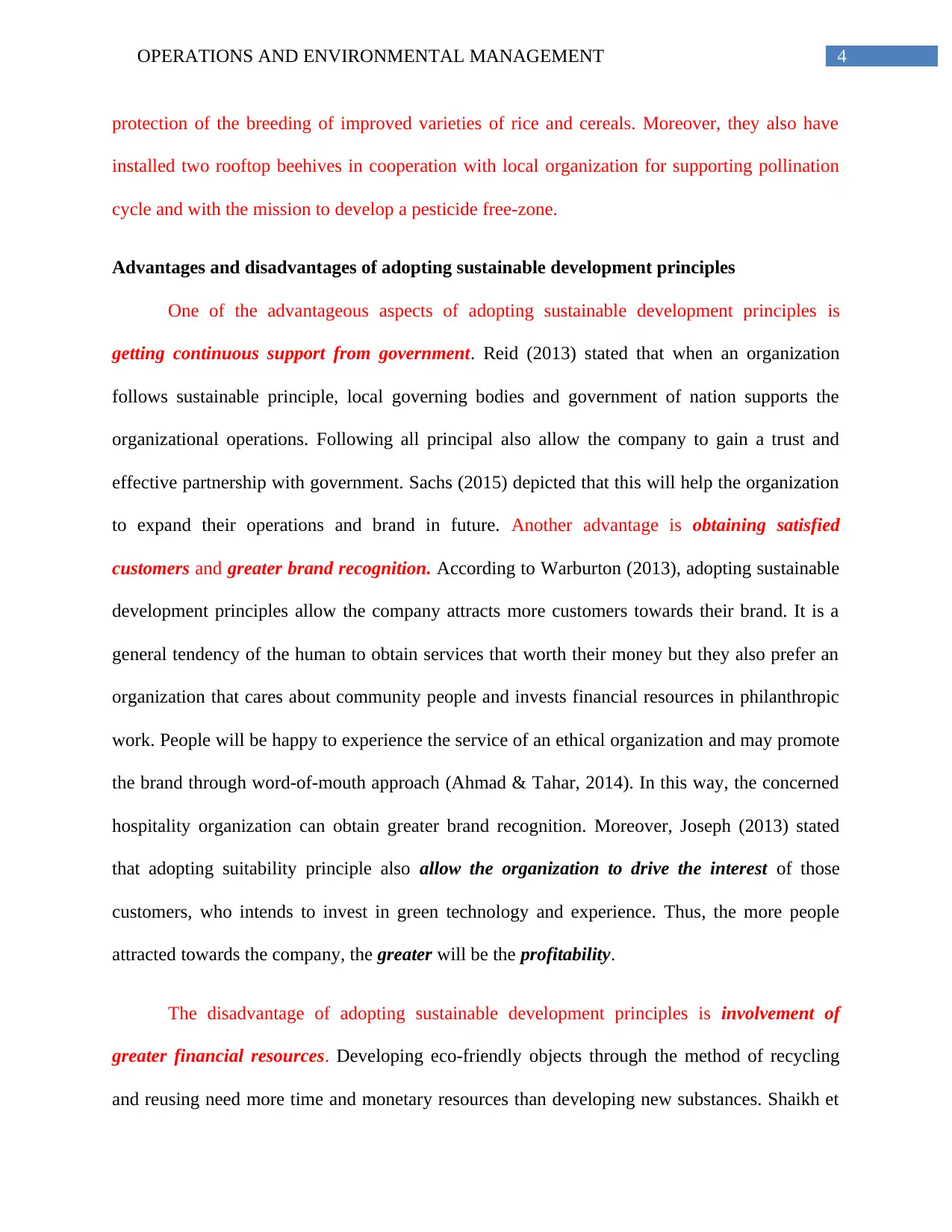
4OPERATIONS AND ENVIRONMENTAL MANAGEMENT
protection of the breeding of improved varieties of rice and cereals. Moreover, they also have
installed two rooftop beehives in cooperation with local organization for supporting pollination
cycle and with the mission to develop a pesticide free-zone.
Advantages and disadvantages of adopting sustainable development principles
One of the advantageous aspects of adopting sustainable development principles is
getting continuous support from government. Reid (2013) stated that when an organization
follows sustainable principle, local governing bodies and government of nation supports the
organizational operations. Following all principal also allow the company to gain a trust and
effective partnership with government. Sachs (2015) depicted that this will help the organization
to expand their operations and brand in future. Another advantage is obtaining satisfied
customers and greater brand recognition. According to Warburton (2013), adopting sustainable
development principles allow the company attracts more customers towards their brand. It is a
general tendency of the human to obtain services that worth their money but they also prefer an
organization that cares about community people and invests financial resources in philanthropic
work. People will be happy to experience the service of an ethical organization and may promote
the brand through word-of-mouth approach (Ahmad & Tahar, 2014). In this way, the concerned
hospitality organization can obtain greater brand recognition. Moreover, Joseph (2013) stated
that adopting suitability principle also allow the organization to drive the interest of those
customers, who intends to invest in green technology and experience. Thus, the more people
attracted towards the company, the greater will be the profitability.
The disadvantage of adopting sustainable development principles is involvement of
greater financial resources. Developing eco-friendly objects through the method of recycling
and reusing need more time and monetary resources than developing new substances. Shaikh et
protection of the breeding of improved varieties of rice and cereals. Moreover, they also have
installed two rooftop beehives in cooperation with local organization for supporting pollination
cycle and with the mission to develop a pesticide free-zone.
Advantages and disadvantages of adopting sustainable development principles
One of the advantageous aspects of adopting sustainable development principles is
getting continuous support from government. Reid (2013) stated that when an organization
follows sustainable principle, local governing bodies and government of nation supports the
organizational operations. Following all principal also allow the company to gain a trust and
effective partnership with government. Sachs (2015) depicted that this will help the organization
to expand their operations and brand in future. Another advantage is obtaining satisfied
customers and greater brand recognition. According to Warburton (2013), adopting sustainable
development principles allow the company attracts more customers towards their brand. It is a
general tendency of the human to obtain services that worth their money but they also prefer an
organization that cares about community people and invests financial resources in philanthropic
work. People will be happy to experience the service of an ethical organization and may promote
the brand through word-of-mouth approach (Ahmad & Tahar, 2014). In this way, the concerned
hospitality organization can obtain greater brand recognition. Moreover, Joseph (2013) stated
that adopting suitability principle also allow the organization to drive the interest of those
customers, who intends to invest in green technology and experience. Thus, the more people
attracted towards the company, the greater will be the profitability.
The disadvantage of adopting sustainable development principles is involvement of
greater financial resources. Developing eco-friendly objects through the method of recycling
and reusing need more time and monetary resources than developing new substances. Shaikh et
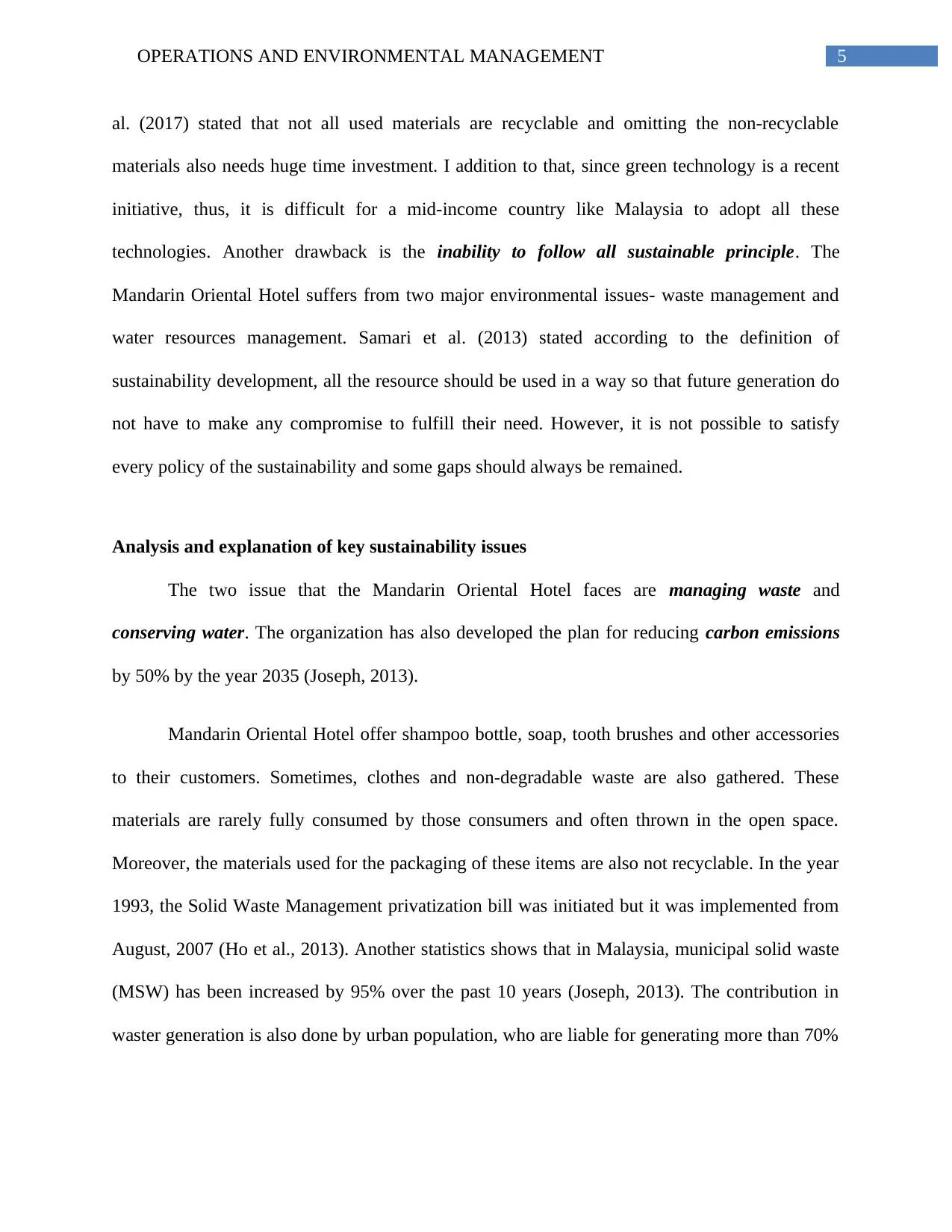
5OPERATIONS AND ENVIRONMENTAL MANAGEMENT
al. (2017) stated that not all used materials are recyclable and omitting the non-recyclable
materials also needs huge time investment. I addition to that, since green technology is a recent
initiative, thus, it is difficult for a mid-income country like Malaysia to adopt all these
technologies. Another drawback is the inability to follow all sustainable principle. The
Mandarin Oriental Hotel suffers from two major environmental issues- waste management and
water resources management. Samari et al. (2013) stated according to the definition of
sustainability development, all the resource should be used in a way so that future generation do
not have to make any compromise to fulfill their need. However, it is not possible to satisfy
every policy of the sustainability and some gaps should always be remained.
Analysis and explanation of key sustainability issues
The two issue that the Mandarin Oriental Hotel faces are managing waste and
conserving water. The organization has also developed the plan for reducing carbon emissions
by 50% by the year 2035 (Joseph, 2013).
Mandarin Oriental Hotel offer shampoo bottle, soap, tooth brushes and other accessories
to their customers. Sometimes, clothes and non-degradable waste are also gathered. These
materials are rarely fully consumed by those consumers and often thrown in the open space.
Moreover, the materials used for the packaging of these items are also not recyclable. In the year
1993, the Solid Waste Management privatization bill was initiated but it was implemented from
August, 2007 (Ho et al., 2013). Another statistics shows that in Malaysia, municipal solid waste
(MSW) has been increased by 95% over the past 10 years (Joseph, 2013). The contribution in
waster generation is also done by urban population, who are liable for generating more than 70%
al. (2017) stated that not all used materials are recyclable and omitting the non-recyclable
materials also needs huge time investment. I addition to that, since green technology is a recent
initiative, thus, it is difficult for a mid-income country like Malaysia to adopt all these
technologies. Another drawback is the inability to follow all sustainable principle. The
Mandarin Oriental Hotel suffers from two major environmental issues- waste management and
water resources management. Samari et al. (2013) stated according to the definition of
sustainability development, all the resource should be used in a way so that future generation do
not have to make any compromise to fulfill their need. However, it is not possible to satisfy
every policy of the sustainability and some gaps should always be remained.
Analysis and explanation of key sustainability issues
The two issue that the Mandarin Oriental Hotel faces are managing waste and
conserving water. The organization has also developed the plan for reducing carbon emissions
by 50% by the year 2035 (Joseph, 2013).
Mandarin Oriental Hotel offer shampoo bottle, soap, tooth brushes and other accessories
to their customers. Sometimes, clothes and non-degradable waste are also gathered. These
materials are rarely fully consumed by those consumers and often thrown in the open space.
Moreover, the materials used for the packaging of these items are also not recyclable. In the year
1993, the Solid Waste Management privatization bill was initiated but it was implemented from
August, 2007 (Ho et al., 2013). Another statistics shows that in Malaysia, municipal solid waste
(MSW) has been increased by 95% over the past 10 years (Joseph, 2013). The contribution in
waster generation is also done by urban population, who are liable for generating more than 70%
⊘ This is a preview!⊘
Do you want full access?
Subscribe today to unlock all pages.

Trusted by 1+ million students worldwide
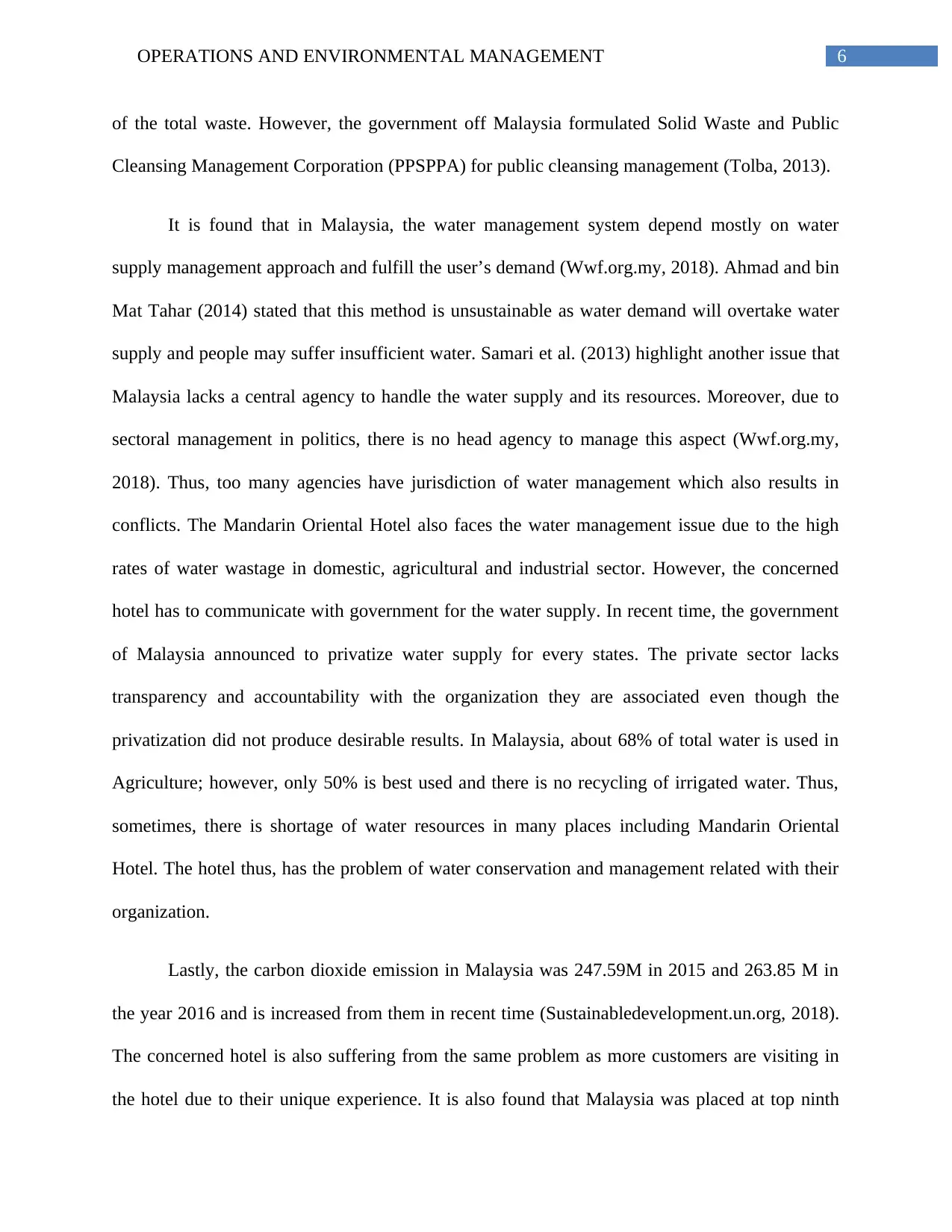
6OPERATIONS AND ENVIRONMENTAL MANAGEMENT
of the total waste. However, the government off Malaysia formulated Solid Waste and Public
Cleansing Management Corporation (PPSPPA) for public cleansing management (Tolba, 2013).
It is found that in Malaysia, the water management system depend mostly on water
supply management approach and fulfill the user’s demand (Wwf.org.my, 2018). Ahmad and bin
Mat Tahar (2014) stated that this method is unsustainable as water demand will overtake water
supply and people may suffer insufficient water. Samari et al. (2013) highlight another issue that
Malaysia lacks a central agency to handle the water supply and its resources. Moreover, due to
sectoral management in politics, there is no head agency to manage this aspect (Wwf.org.my,
2018). Thus, too many agencies have jurisdiction of water management which also results in
conflicts. The Mandarin Oriental Hotel also faces the water management issue due to the high
rates of water wastage in domestic, agricultural and industrial sector. However, the concerned
hotel has to communicate with government for the water supply. In recent time, the government
of Malaysia announced to privatize water supply for every states. The private sector lacks
transparency and accountability with the organization they are associated even though the
privatization did not produce desirable results. In Malaysia, about 68% of total water is used in
Agriculture; however, only 50% is best used and there is no recycling of irrigated water. Thus,
sometimes, there is shortage of water resources in many places including Mandarin Oriental
Hotel. The hotel thus, has the problem of water conservation and management related with their
organization.
Lastly, the carbon dioxide emission in Malaysia was 247.59M in 2015 and 263.85 M in
the year 2016 and is increased from them in recent time (Sustainabledevelopment.un.org, 2018).
The concerned hotel is also suffering from the same problem as more customers are visiting in
the hotel due to their unique experience. It is also found that Malaysia was placed at top ninth
of the total waste. However, the government off Malaysia formulated Solid Waste and Public
Cleansing Management Corporation (PPSPPA) for public cleansing management (Tolba, 2013).
It is found that in Malaysia, the water management system depend mostly on water
supply management approach and fulfill the user’s demand (Wwf.org.my, 2018). Ahmad and bin
Mat Tahar (2014) stated that this method is unsustainable as water demand will overtake water
supply and people may suffer insufficient water. Samari et al. (2013) highlight another issue that
Malaysia lacks a central agency to handle the water supply and its resources. Moreover, due to
sectoral management in politics, there is no head agency to manage this aspect (Wwf.org.my,
2018). Thus, too many agencies have jurisdiction of water management which also results in
conflicts. The Mandarin Oriental Hotel also faces the water management issue due to the high
rates of water wastage in domestic, agricultural and industrial sector. However, the concerned
hotel has to communicate with government for the water supply. In recent time, the government
of Malaysia announced to privatize water supply for every states. The private sector lacks
transparency and accountability with the organization they are associated even though the
privatization did not produce desirable results. In Malaysia, about 68% of total water is used in
Agriculture; however, only 50% is best used and there is no recycling of irrigated water. Thus,
sometimes, there is shortage of water resources in many places including Mandarin Oriental
Hotel. The hotel thus, has the problem of water conservation and management related with their
organization.
Lastly, the carbon dioxide emission in Malaysia was 247.59M in 2015 and 263.85 M in
the year 2016 and is increased from them in recent time (Sustainabledevelopment.un.org, 2018).
The concerned hotel is also suffering from the same problem as more customers are visiting in
the hotel due to their unique experience. It is also found that Malaysia was placed at top ninth
Paraphrase This Document
Need a fresh take? Get an instant paraphrase of this document with our AI Paraphraser
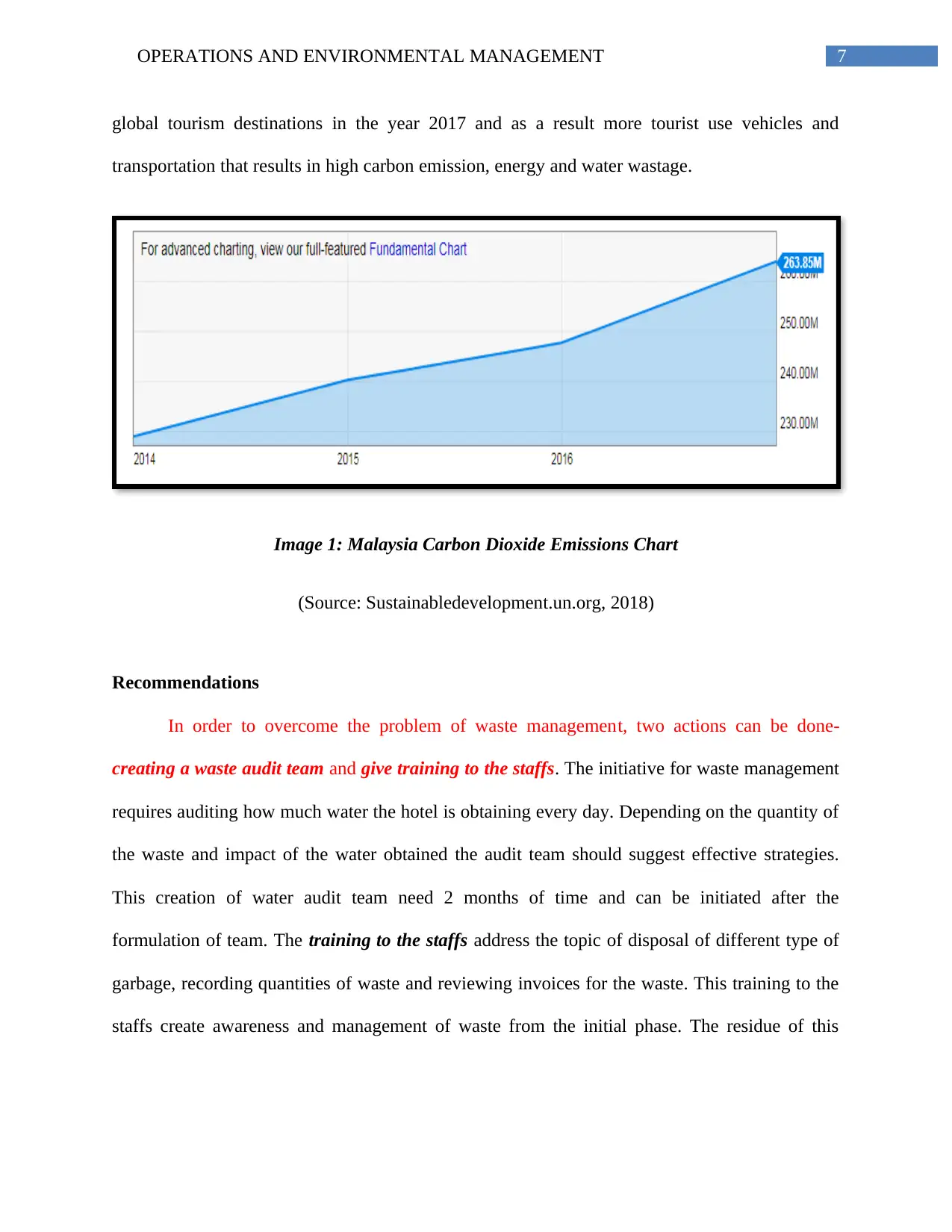
7OPERATIONS AND ENVIRONMENTAL MANAGEMENT
global tourism destinations in the year 2017 and as a result more tourist use vehicles and
transportation that results in high carbon emission, energy and water wastage.
Image 1: Malaysia Carbon Dioxide Emissions Chart
(Source: Sustainabledevelopment.un.org, 2018)
Recommendations
In order to overcome the problem of waste management, two actions can be done-
creating a waste audit team and give training to the staffs. The initiative for waste management
requires auditing how much water the hotel is obtaining every day. Depending on the quantity of
the waste and impact of the water obtained the audit team should suggest effective strategies.
This creation of water audit team need 2 months of time and can be initiated after the
formulation of team. The training to the staffs address the topic of disposal of different type of
garbage, recording quantities of waste and reviewing invoices for the waste. This training to the
staffs create awareness and management of waste from the initial phase. The residue of this
global tourism destinations in the year 2017 and as a result more tourist use vehicles and
transportation that results in high carbon emission, energy and water wastage.
Image 1: Malaysia Carbon Dioxide Emissions Chart
(Source: Sustainabledevelopment.un.org, 2018)
Recommendations
In order to overcome the problem of waste management, two actions can be done-
creating a waste audit team and give training to the staffs. The initiative for waste management
requires auditing how much water the hotel is obtaining every day. Depending on the quantity of
the waste and impact of the water obtained the audit team should suggest effective strategies.
This creation of water audit team need 2 months of time and can be initiated after the
formulation of team. The training to the staffs address the topic of disposal of different type of
garbage, recording quantities of waste and reviewing invoices for the waste. This training to the
staffs create awareness and management of waste from the initial phase. The residue of this
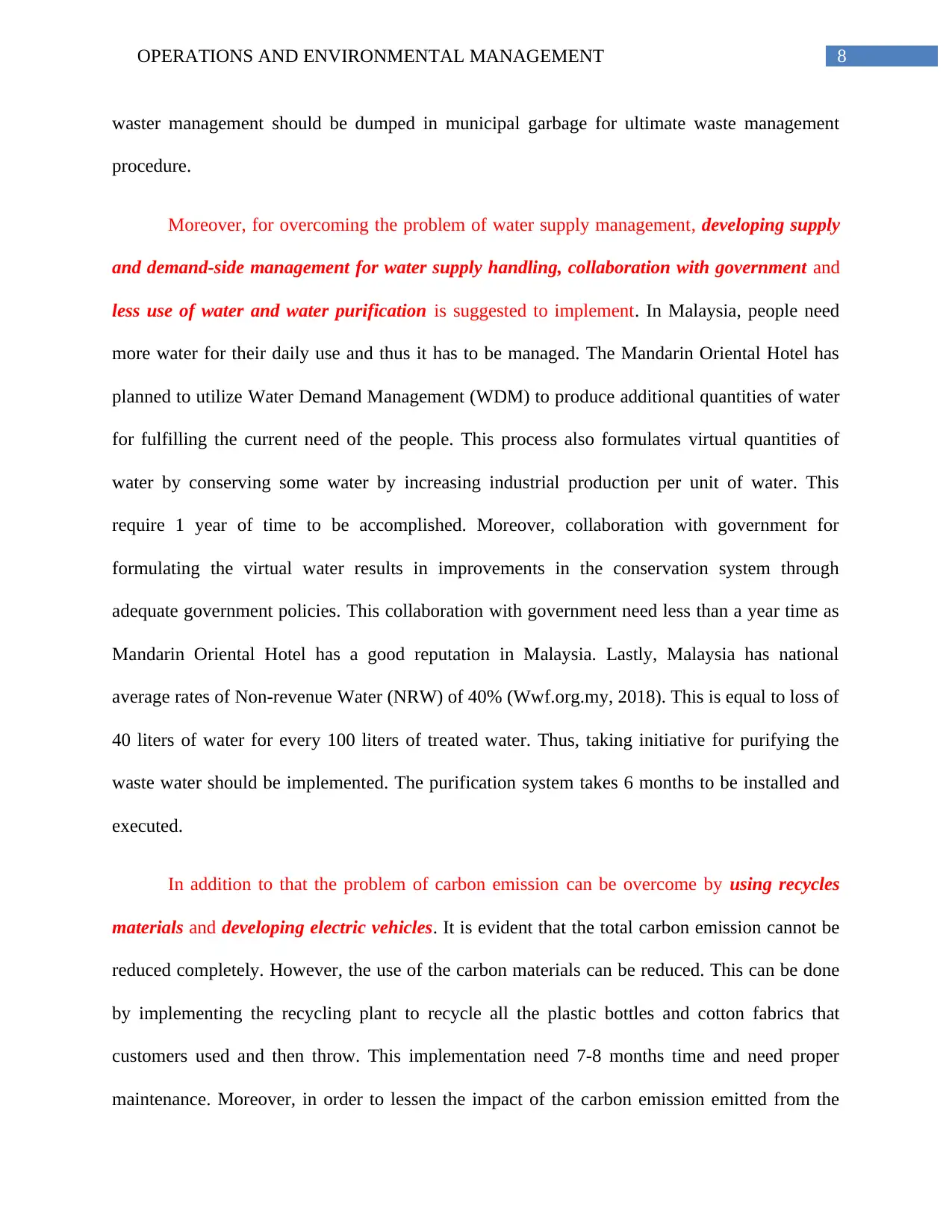
8OPERATIONS AND ENVIRONMENTAL MANAGEMENT
waster management should be dumped in municipal garbage for ultimate waste management
procedure.
Moreover, for overcoming the problem of water supply management, developing supply
and demand-side management for water supply handling, collaboration with government and
less use of water and water purification is suggested to implement. In Malaysia, people need
more water for their daily use and thus it has to be managed. The Mandarin Oriental Hotel has
planned to utilize Water Demand Management (WDM) to produce additional quantities of water
for fulfilling the current need of the people. This process also formulates virtual quantities of
water by conserving some water by increasing industrial production per unit of water. This
require 1 year of time to be accomplished. Moreover, collaboration with government for
formulating the virtual water results in improvements in the conservation system through
adequate government policies. This collaboration with government need less than a year time as
Mandarin Oriental Hotel has a good reputation in Malaysia. Lastly, Malaysia has national
average rates of Non-revenue Water (NRW) of 40% (Wwf.org.my, 2018). This is equal to loss of
40 liters of water for every 100 liters of treated water. Thus, taking initiative for purifying the
waste water should be implemented. The purification system takes 6 months to be installed and
executed.
In addition to that the problem of carbon emission can be overcome by using recycles
materials and developing electric vehicles. It is evident that the total carbon emission cannot be
reduced completely. However, the use of the carbon materials can be reduced. This can be done
by implementing the recycling plant to recycle all the plastic bottles and cotton fabrics that
customers used and then throw. This implementation need 7-8 months time and need proper
maintenance. Moreover, in order to lessen the impact of the carbon emission emitted from the
waster management should be dumped in municipal garbage for ultimate waste management
procedure.
Moreover, for overcoming the problem of water supply management, developing supply
and demand-side management for water supply handling, collaboration with government and
less use of water and water purification is suggested to implement. In Malaysia, people need
more water for their daily use and thus it has to be managed. The Mandarin Oriental Hotel has
planned to utilize Water Demand Management (WDM) to produce additional quantities of water
for fulfilling the current need of the people. This process also formulates virtual quantities of
water by conserving some water by increasing industrial production per unit of water. This
require 1 year of time to be accomplished. Moreover, collaboration with government for
formulating the virtual water results in improvements in the conservation system through
adequate government policies. This collaboration with government need less than a year time as
Mandarin Oriental Hotel has a good reputation in Malaysia. Lastly, Malaysia has national
average rates of Non-revenue Water (NRW) of 40% (Wwf.org.my, 2018). This is equal to loss of
40 liters of water for every 100 liters of treated water. Thus, taking initiative for purifying the
waste water should be implemented. The purification system takes 6 months to be installed and
executed.
In addition to that the problem of carbon emission can be overcome by using recycles
materials and developing electric vehicles. It is evident that the total carbon emission cannot be
reduced completely. However, the use of the carbon materials can be reduced. This can be done
by implementing the recycling plant to recycle all the plastic bottles and cotton fabrics that
customers used and then throw. This implementation need 7-8 months time and need proper
maintenance. Moreover, in order to lessen the impact of the carbon emission emitted from the
⊘ This is a preview!⊘
Do you want full access?
Subscribe today to unlock all pages.

Trusted by 1+ million students worldwide
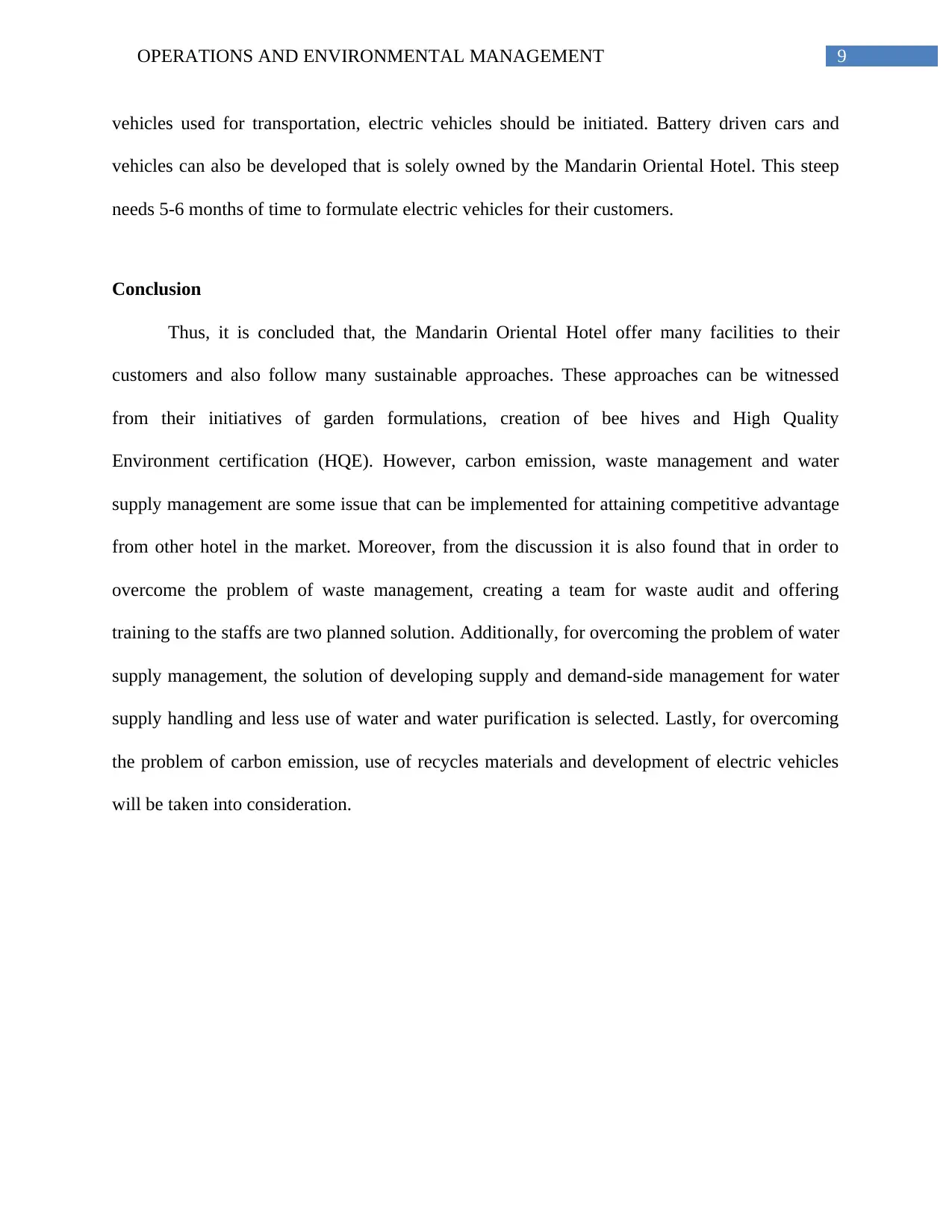
9OPERATIONS AND ENVIRONMENTAL MANAGEMENT
vehicles used for transportation, electric vehicles should be initiated. Battery driven cars and
vehicles can also be developed that is solely owned by the Mandarin Oriental Hotel. This steep
needs 5-6 months of time to formulate electric vehicles for their customers.
Conclusion
Thus, it is concluded that, the Mandarin Oriental Hotel offer many facilities to their
customers and also follow many sustainable approaches. These approaches can be witnessed
from their initiatives of garden formulations, creation of bee hives and High Quality
Environment certification (HQE). However, carbon emission, waste management and water
supply management are some issue that can be implemented for attaining competitive advantage
from other hotel in the market. Moreover, from the discussion it is also found that in order to
overcome the problem of waste management, creating a team for waste audit and offering
training to the staffs are two planned solution. Additionally, for overcoming the problem of water
supply management, the solution of developing supply and demand-side management for water
supply handling and less use of water and water purification is selected. Lastly, for overcoming
the problem of carbon emission, use of recycles materials and development of electric vehicles
will be taken into consideration.
vehicles used for transportation, electric vehicles should be initiated. Battery driven cars and
vehicles can also be developed that is solely owned by the Mandarin Oriental Hotel. This steep
needs 5-6 months of time to formulate electric vehicles for their customers.
Conclusion
Thus, it is concluded that, the Mandarin Oriental Hotel offer many facilities to their
customers and also follow many sustainable approaches. These approaches can be witnessed
from their initiatives of garden formulations, creation of bee hives and High Quality
Environment certification (HQE). However, carbon emission, waste management and water
supply management are some issue that can be implemented for attaining competitive advantage
from other hotel in the market. Moreover, from the discussion it is also found that in order to
overcome the problem of waste management, creating a team for waste audit and offering
training to the staffs are two planned solution. Additionally, for overcoming the problem of water
supply management, the solution of developing supply and demand-side management for water
supply handling and less use of water and water purification is selected. Lastly, for overcoming
the problem of carbon emission, use of recycles materials and development of electric vehicles
will be taken into consideration.
Paraphrase This Document
Need a fresh take? Get an instant paraphrase of this document with our AI Paraphraser
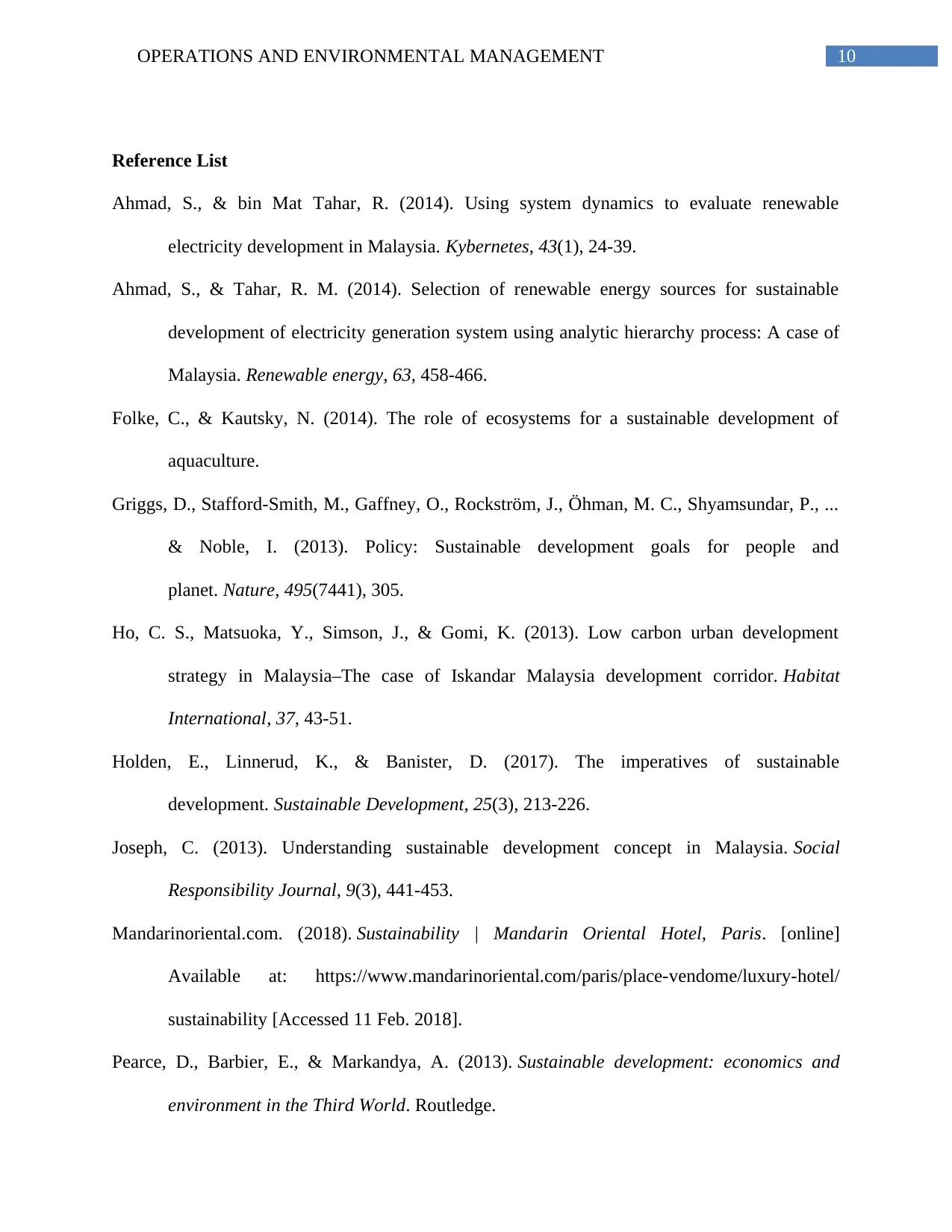
10OPERATIONS AND ENVIRONMENTAL MANAGEMENT
Reference List
Ahmad, S., & bin Mat Tahar, R. (2014). Using system dynamics to evaluate renewable
electricity development in Malaysia. Kybernetes, 43(1), 24-39.
Ahmad, S., & Tahar, R. M. (2014). Selection of renewable energy sources for sustainable
development of electricity generation system using analytic hierarchy process: A case of
Malaysia. Renewable energy, 63, 458-466.
Folke, C., & Kautsky, N. (2014). The role of ecosystems for a sustainable development of
aquaculture.
Griggs, D., Stafford-Smith, M., Gaffney, O., Rockström, J., Öhman, M. C., Shyamsundar, P., ...
& Noble, I. (2013). Policy: Sustainable development goals for people and
planet. Nature, 495(7441), 305.
Ho, C. S., Matsuoka, Y., Simson, J., & Gomi, K. (2013). Low carbon urban development
strategy in Malaysia–The case of Iskandar Malaysia development corridor. Habitat
International, 37, 43-51.
Holden, E., Linnerud, K., & Banister, D. (2017). The imperatives of sustainable
development. Sustainable Development, 25(3), 213-226.
Joseph, C. (2013). Understanding sustainable development concept in Malaysia. Social
Responsibility Journal, 9(3), 441-453.
Mandarinoriental.com. (2018). Sustainability | Mandarin Oriental Hotel, Paris. [online]
Available at: https://www.mandarinoriental.com/paris/place-vendome/luxury-hotel/
sustainability [Accessed 11 Feb. 2018].
Pearce, D., Barbier, E., & Markandya, A. (2013). Sustainable development: economics and
environment in the Third World. Routledge.
Reference List
Ahmad, S., & bin Mat Tahar, R. (2014). Using system dynamics to evaluate renewable
electricity development in Malaysia. Kybernetes, 43(1), 24-39.
Ahmad, S., & Tahar, R. M. (2014). Selection of renewable energy sources for sustainable
development of electricity generation system using analytic hierarchy process: A case of
Malaysia. Renewable energy, 63, 458-466.
Folke, C., & Kautsky, N. (2014). The role of ecosystems for a sustainable development of
aquaculture.
Griggs, D., Stafford-Smith, M., Gaffney, O., Rockström, J., Öhman, M. C., Shyamsundar, P., ...
& Noble, I. (2013). Policy: Sustainable development goals for people and
planet. Nature, 495(7441), 305.
Ho, C. S., Matsuoka, Y., Simson, J., & Gomi, K. (2013). Low carbon urban development
strategy in Malaysia–The case of Iskandar Malaysia development corridor. Habitat
International, 37, 43-51.
Holden, E., Linnerud, K., & Banister, D. (2017). The imperatives of sustainable
development. Sustainable Development, 25(3), 213-226.
Joseph, C. (2013). Understanding sustainable development concept in Malaysia. Social
Responsibility Journal, 9(3), 441-453.
Mandarinoriental.com. (2018). Sustainability | Mandarin Oriental Hotel, Paris. [online]
Available at: https://www.mandarinoriental.com/paris/place-vendome/luxury-hotel/
sustainability [Accessed 11 Feb. 2018].
Pearce, D., Barbier, E., & Markandya, A. (2013). Sustainable development: economics and
environment in the Third World. Routledge.
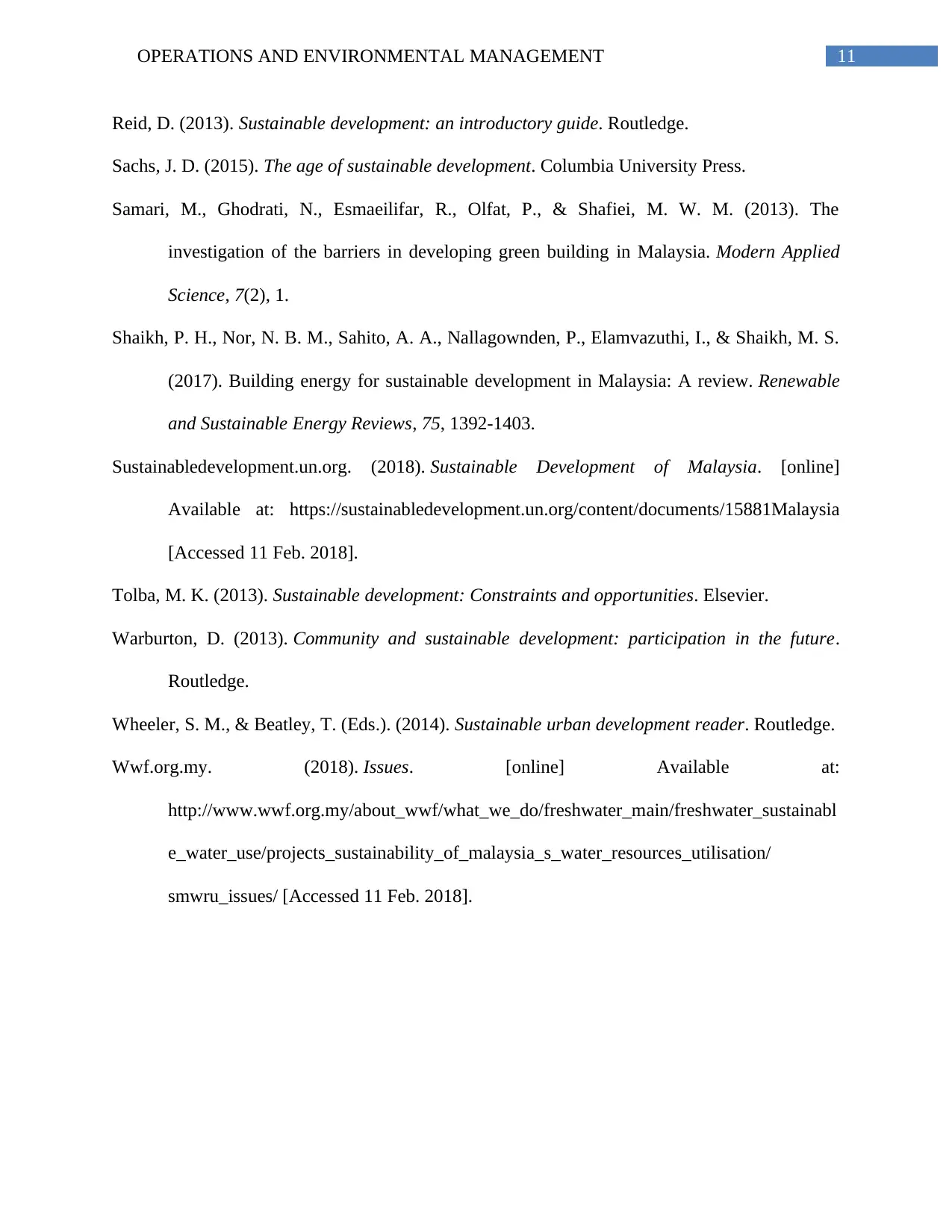
11OPERATIONS AND ENVIRONMENTAL MANAGEMENT
Reid, D. (2013). Sustainable development: an introductory guide. Routledge.
Sachs, J. D. (2015). The age of sustainable development. Columbia University Press.
Samari, M., Ghodrati, N., Esmaeilifar, R., Olfat, P., & Shafiei, M. W. M. (2013). The
investigation of the barriers in developing green building in Malaysia. Modern Applied
Science, 7(2), 1.
Shaikh, P. H., Nor, N. B. M., Sahito, A. A., Nallagownden, P., Elamvazuthi, I., & Shaikh, M. S.
(2017). Building energy for sustainable development in Malaysia: A review. Renewable
and Sustainable Energy Reviews, 75, 1392-1403.
Sustainabledevelopment.un.org. (2018). Sustainable Development of Malaysia. [online]
Available at: https://sustainabledevelopment.un.org/content/documents/15881Malaysia
[Accessed 11 Feb. 2018].
Tolba, M. K. (2013). Sustainable development: Constraints and opportunities. Elsevier.
Warburton, D. (2013). Community and sustainable development: participation in the future.
Routledge.
Wheeler, S. M., & Beatley, T. (Eds.). (2014). Sustainable urban development reader. Routledge.
Wwf.org.my. (2018). Issues. [online] Available at:
http://www.wwf.org.my/about_wwf/what_we_do/freshwater_main/freshwater_sustainabl
e_water_use/projects_sustainability_of_malaysia_s_water_resources_utilisation/
smwru_issues/ [Accessed 11 Feb. 2018].
Reid, D. (2013). Sustainable development: an introductory guide. Routledge.
Sachs, J. D. (2015). The age of sustainable development. Columbia University Press.
Samari, M., Ghodrati, N., Esmaeilifar, R., Olfat, P., & Shafiei, M. W. M. (2013). The
investigation of the barriers in developing green building in Malaysia. Modern Applied
Science, 7(2), 1.
Shaikh, P. H., Nor, N. B. M., Sahito, A. A., Nallagownden, P., Elamvazuthi, I., & Shaikh, M. S.
(2017). Building energy for sustainable development in Malaysia: A review. Renewable
and Sustainable Energy Reviews, 75, 1392-1403.
Sustainabledevelopment.un.org. (2018). Sustainable Development of Malaysia. [online]
Available at: https://sustainabledevelopment.un.org/content/documents/15881Malaysia
[Accessed 11 Feb. 2018].
Tolba, M. K. (2013). Sustainable development: Constraints and opportunities. Elsevier.
Warburton, D. (2013). Community and sustainable development: participation in the future.
Routledge.
Wheeler, S. M., & Beatley, T. (Eds.). (2014). Sustainable urban development reader. Routledge.
Wwf.org.my. (2018). Issues. [online] Available at:
http://www.wwf.org.my/about_wwf/what_we_do/freshwater_main/freshwater_sustainabl
e_water_use/projects_sustainability_of_malaysia_s_water_resources_utilisation/
smwru_issues/ [Accessed 11 Feb. 2018].
⊘ This is a preview!⊘
Do you want full access?
Subscribe today to unlock all pages.

Trusted by 1+ million students worldwide
1 out of 13
Related Documents
Your All-in-One AI-Powered Toolkit for Academic Success.
+13062052269
info@desklib.com
Available 24*7 on WhatsApp / Email
![[object Object]](/_next/static/media/star-bottom.7253800d.svg)
Unlock your academic potential
Copyright © 2020–2026 A2Z Services. All Rights Reserved. Developed and managed by ZUCOL.





